- Home
- Edith Wharton
The 2014 Halloween Horrors Megapack Page 4
The 2014 Halloween Horrors Megapack Read online
Page 4
Frenham, his face still hidden, did not stir.
MYSTERIOUS MAISIE, by Wirt Gerrare
DEAR MR. VESEY—
It is very good of you to interest yourself in my behalf in our quest for “Mysterious Maisie”—so we have named the kind creature—and I lose no time in giving you not only all the facts concerning her visits, but many details of my sister’s strange experiences. For the best of reasons I cannot add to the particulars now given; you have the whole story, and nothing extraneous to it, save such slight embellishments as my sister herself has written in her letters and journal, and some explanatory comments by myself to references which would be unintelligible to a stranger.
I will preface the story by stating that my sister Laura was seventeen when our father died; in our straitened circumstances, and with mother’s health failing, it was needful that she should at once earn her living. She was not fitted for teaching, and had she been so, I think my experiences as assistant mistress of a High School were well enough known to her to act as an efficient repellant from embarking upon a like career. She was accomplished, fond of literature, painted a little, played well, and was of such a kindly disposition that she seemed eminently fitted for the post of companion to an elderly or invalid lady, and we were glad to accept a situation of this kind for her. True it was obtained through an agency, but the references were quite satisfactory, and such enquiries as we could make brought replies which reassured us, and we were confident that Laura would quickly gain the affection of all with whom she came in contact. My sister at that time was very pretty; she had a really beautiful face, but she was petite, very slight, very fragile; a delicately nurtured child, but full of verve, and not wanting in courage. She was not unduly timorous, nor was she over imaginative, and so truthful in all she said, and honest in all she did, that I accept as actual fact every statement she has made, exaggerated though those accounts may appear, and extraordinary as they undoubtedly are. But to the story. My sister wrote in her journal, under the date of October 22nd, 1889, the following.
* * * *
“Arrived safely at Willesden Junction at 4.33; after waiting nearly half-an-hour, took the train to ———, reaching that station in less than twenty minutes; took a ‘four-wheeler’ to Miss Mure’s. The streets had a very dingy appearance, is a dowdy suburb. Soon we turned down a winding lane, very badly fenced, not many houses in it, they were all old and were built on one side of the road; plenty of trees, nearly all of them bare of leaves. The car stopped in a wider road just out of the lane; the house looks old and badly kept from the outside; it stands back about twelve yards from the road. The garden in front is very badly kept—I have not yet seen that at the back—it is walled in, with iron palisades on the top of the wall, and ivy and other creepers grow over the fence as well as over the house. The front gate is in an iron arch, and was locked. The maid, whose name is Agnes, was a long time answering our appeal; then, when she saw who it was, she went back into the house for the key, so the cabman put my box on the footway, I paid him, and he drove away. I did not at all like the look of the house or the garden, and the cold flagstones with which the walk from the gate to the front door is paved are very ugly and cheerless. Agnes locked the gate again before we went into the house. In the little hall it was so dark I could not see anything, but when the door was shut, and we opened another leading to the stairs, I felt that the front door was lined with sheet iron. Every time I see such a door I think of the house in which Bill Sikes made his last stand, but I do not want to frighten myself. My room is large; it has a four-post bedstead with green rep hangings, a chest-upon-chest, an old closed press, and some old-fashioned chairs. The only lights are candles, the window is small, overgrown with a creeper from which the leaves are fast falling, and is barred with five iron bars and some ornamental scroll work. There are very curious prints on the wall, and some designs, which I cannot make out, on the ceiling. In the walls there are three doors, not counting the one in use; one of those has no bolts, but is locked. I have placed my box against it.
“I have not seen Miss Mure. Agnes tells me she does not wish to see me until to-morrow. I have had tea in the front room downstairs. It is a long, narrow room, with three tall and very narrow windows looking into the front garden, and a smaller window at the side, by the fire-place, also looking out upon the garden. There is a door leading to the drawing-room, which is at the back of the house. The room seemed to be very dark, but perhaps that was due to the dismal light out of doors, and the thick growth of trees and shrubs in front. When the candles were lit—we have no gas nor lamps—I saw that the room had a papered ceiling, a dirty, cream-coloured ground, with an open floral design in blue. The walls are panelled half way, the upper half is covered with an ornamental net reaching up to the cornice; at the back of the netting the wall is plastered over with canvas, which some time was painted stone colour. There are no pictures in the room. It is not home-like or cosy, and I do not admire the style; but I have never seen anything at all like it before, perhaps it will be better when I am accustomed to it; at present there is an air of mystery about the house and its inmates.
“Since I wrote the above I have had a talk with Agnes. I hope nothing she told me was true. She is a strange woman; but she says she has been here over fourteen years, so I cannot think things are so bad as she represents them to be. If her idea was to frighten me, she failed; I do not believe her silly tales. At first I was amused at her talk, for she speaks the true cockney dialect, and with a peculiar inflexion, very different to the accent habitual to people of the Midlands. I think Agnes is good-natured, but it was cruel to attempt to frighten me with silly superstitions; she is very ignorant if she does not know that all she said is false. I hope Miss Mure is more enlightened, otherwise my sojourn here will not be pleasant. I judge them to be funny people; they must be eccentric, or they would not keep a crocodile for a pet.
“Agnes says that my room is called the dragon room, from the pattern upon the ceiling. I am to go later into ‘Caduceus,’ but she persuaded Miss Mure to let me have the larger room at first, as being more homelike. I wonder what ‘Caduceus’ is like! There are seven bedrooms—some of them must be very small—and one over the back kitchen; in that Agnes sleeps, and it is reached by different stairs.
“After her silly tales about hauntings, I asked her why she did not keep a dog. She replied that she had tried several times to get one to stay, but they all ran away. ‘They sees ‘em, and they won’t stop. Why there’s Draysen’s bull terrier, what’ll kill anythin’ livin’; when I come with the meat one day, I ‘ticed him in through the side entrance, and put him in the back garden. He were right savage when I shut the door on him, but ‘c no sooner turned round and looked the other way than his tail dropped, and he whined that awful I were glad to let ‘im out there and then. But we must ha’ summut, so we’ve got Sivvy.’
“‘And what is Sivvy?’” I asked.
“For answer, Agnes commenced to explain that Miss Mure is a spiritualist, and constantly attended by a lot of spiritual companions, so that dogs and other animals dread her. At this I laughed heartily. Agnes was not offended, but she said I evidently knew very little of such matters. We were then silent for a few minutes, and I heard mumblings and scratchings. ‘Is that Sivvy?’ I asked laughingly. ‘No,’ she replied very seriously, ‘they’re at it agen,’ by they meaning the spirits, I suppose; but after listening she said it was the ‘sooterkin,’ at which I was, of course, as wise as before. I shall have to enlarge my vocabulary very considerably before understanding the inmates of this house. Sivvy frightened me much more than any ghost is likely to do. She is a huge crocodile, nearly four feet in length, and she ran, or rather waddled, straight towards me as soon as the door to the kitchen was opened; she hissed the whole time, and sent one of the chairs spinning by a blow from her tail. Agnes had ready a rough and much torn Turkish towel, which she threw over Sivvy ‘s head; the reptile snapped savagely at it, and got its teeth entangled in the
threads, and being also blindfolded by the towel, was quiet until Agnes seized its snout with her left hand, and taking its right thigh in her other, lifted it from the floor. It then commenced to lash savagely with its tail, and if Agnes was not badly hurt by the blows, she must be destitute of feeling; but it was only for an instant, for she slipped the reptile into a tank underneath the side-table by the window. She looked hot and flurried when the business was over, but she gave me to understand that the vicious thing was always loose in the outer kitchen, and that I must not presume to pass that way unless she accompanied me. She said also that Sivvy was in and out of the tank in her kitchen all night; a significant hint that neither I nor Miss Mure must venture beyond our own quarters after Sivvy’s supper time.
“I did not sleep very well last night. Someone was in and out of my room several times, but they did not reply to my challenge, and as they did not molest me, no harm is done. I expect it was Agnes, trying to convince me of the truth of her ghost stories. I saw Miss Mure just after twelve o’clock to-day. She is an ogress. I think she is harmless, for she is nearly blind, but she is dreadful to look upon; very big, very stout, with a great fat face and tremendous cheeks and neck. She speaks in a very snappy, peremptory manner, but what she has said so far has not been disagreeable. My chief duty it appears is to read to her in the afternoons. We commenced to-day; she has a large number of books, but they are very old and about many curious things. Some of them arc in black letter, which is very hard to read; some are in Latin, which I can read, but cannot understand. Miss Mure says, so much the better. When she tries to read she has to bring the volume quite close to her nose, and then runs along the line. It must be very trying work for her, but it is quite comical to see. We finished by reading in a book called Certaine Secret Wonders of Nature, and I had to copy out the following description of a monster, for Miss Mure said she knew where there was one just like it, only it was nearly six months old; she seemed very much interested in the description, which she has learned by heart.
“‘Begotten of honourable parents, yet was he most horrible, deformed and fearefull, having his eyes of the colour of fire, his mouth and his nose like to the snoute of an Oxe, wyth an Home annexed thereunto like the Trumpe of an Elephant; all hys back shagge-hairde like a dogge, and in place where other men be accustomed to have brests, he had two heads of an Ape, hauing above his nauell marked the eies of a cat, and joyned to his knee and armes foure heades of a dog, with a grenning and fearefull countenance. The palmes of his feet and handes were like to those of an Ape; and among the rest he had a taile turning up so high, that the height thereof was half an elle; who after he had lived foure houres died.’
“A fortnight has passed since I last wrote in my journal. I have had two letters from my sister Maggie, and one from mother; both complain that they have not heard from me, save by the note advising my arrival. I have given three letters to Agnes to post for me, to-day I found them on the dresser in her kitchen. I am not allowed to go out of the house at all; first one excuse and then another is made, but I shall soon see whether or not any attempt will be made to keep me prisoner here. Two people have been at different times to sec Miss Mure, but the interviews have been private. There is very little variety in the life we lead, and our reading is confined to the same class of book. I have become quite learned respecting goblin-land. I should know much more if I understood better the Latin books I have to read, but they are printed in such strange type and with so many abbreviations, that I have to concentrate my attention upon the words, not the sense. How different this world to the one about which I used to read, and in which I used to live! This is one peopled by demons, phantoms, vampires, ghouls, boggarts, and nixies. Names of things of which I knew nothing are now so familiar that the creatures themselves appear to have real existence. The Arabian Nights are not more fantastic than our gospels; and Lemprire would have found ours a more marvellous world to catalogue than the classical mythical to which he devoted his learning. Ours is a world of luprachaun and clurichaune, deev and cloolie, and through the maze of mystery I have to thread my painful way, now learning how to distinguish oufe from pooka, and nis from pixy; study long screeds upon the doings of effreets and dwergers, or decipher the dwaul of delirious monks who have made homunculi from refuse. Waking or sleeping, the image of some uncouth form is always present to me. What would I not give for a volume by the once despised “A. L. O. E.” or prosy Emma Worboise? Talk of the troubles of Winifred Bertram or Jane Eyre, what are they to mine? Talented authoresses do not seem to know that however terrible it may be to have as a neighbour a mad woman in a tower, it is much worse to have to live in a kitchen with a crocodile. This elementary fact has escaped the notice of writers of fiction; the re-statement of it has induced me to reconsider my decision as to the most longed-for book; my choice now is the Swiss Family Robinson. In it I have no doubt I should find how to make even the crocodile useful, or how to kill it, which would be still better.
“It is a month to-day since I left home. It seems a year. I am conscious of a great change in myself; this cooped-up life, the whole of my time passed in the company of people for whom I have no affection, and my thoughts engaged with things to which I have a natural aversion, have altered my character. That this change was desired by my employer I am certain. The atmosphere of mystery and unreality which pervades this house has broken my nerve. The trifling irregularities at which I used to laugh now oppress me; the dream faces, the scrapings, the waving of the bed-curtains, the footsteps and the scurrying, which disturb my rest, I cannot attribute to my imagination. Until a week or so ago I felt strong enough to dismiss them as absurdities, now I do not know what to think. I see strange forms disappearing from the rooms as I enter them; creatures, like to nothing in the heaven above or in the earth beneath, trip across the landing as I mount the stairs to my chamber; small headless beasts creep through the skirting-board on the corridor to hide themselves from my gaze, and these matters now affect me greatly. In the words of Job, ‘Fear came upon me, and trembling, which made all my bones to shake. Then a spirit passed before my face; the hair of my flesh stood up : it stood still, but I could not discern the form thereof.’ I am quite in the power of Miss Mure; she takes my hand in hers, and I know not how the time passes, but I feel weak and listless; even the letters from Maggie and mother do not interest me; they are in answer to letters I do not remember to have written. There has been one gathering here for the performance of the rites of the higher mystery. I was present, but I remember very little of them; one great horror excluded all others. A thing they brought here, half human, half—I know not what. I was in the front room downstairs when it arrived. It stood on two splayed feet outside the front gate when I first saw it, and its hand was grasped by a sad-looking, demure little man, with white hair, and wearing large blue spectacles. Its face was hidden by a dark silk pocket-handkerchief tucked in under the edge of a heavy cloth cap, and it made uncouth noises, and tugged at the bars of the gate like a wild beast in its cage. At the séance we were in semi-darkness; at the table it was placed right opposite me, and the cap and handkerchief were removed—but it would be wicked to describe what was disclosed—neither God nor demon could have made that horror! Its keeper stood at the back of it, and he had taken from the black handbag he carried a short, stiff stick with a pear-shaped end, with which he energetically cudgelled the horror about the elbows when it tried to get across the table to me; apparently the only thing it sought to do. Strange shapes flitted about in the gloom, harsh noises were made, there was some weird chanting and hysterical sobbing; the sooterkin was brought from its warm-lined hatching-box, and twitched two tentacles sluggishly after the manner of a moribund jelly-fish; but my attention was riveted on the horror before whom I crouched. Since the séance I have had more leisure, and have hardly seen Miss Mure, who is engaged in preparations for some other orgie; thus I have time, and now some inclination, to write once more.
“Agnes tells me that I am soon to go into
‘Caduceus,’ a small room at the back of the house. It looks out upon that corner of the garden which is a dense tangle of shrub and bramble. It is at the angle nearest to a low building which has been built on a piece of land cut off from the garden. The building, Agnes says, is the mortuary for this district, and it is only when there are bodies there that Miss Mure convenes a meeting. The girl who came to the last stance and sat at my side is, Agnes informs me, a successful sorceress. Only a short time ago she was robust, stout, and healthy; now she is like a walking corpse, and she draws her strength from those of her acquaintance who do not shun her. If Agnes is to be believed, this Miss Buimbert must be a sort of soul vampire, sucking the spirituality from every person who allows her to approach within range of her influence. I was doubtful whether she was in reality a person or only the phantom of one; it has become so hard to me now to distinguish the actual from the seemingly real. I know that the headless forms and curious creatures which are ever flitting before me, and disappearing at my approach, are but illusions or phantasms conjured by Miss Mure to make an impression upon me, and it is to her that I owe the visitations of intangible visionary monsters who disturb my rest with groans, and make my waking moments horrible by their hideous grimaces and threatening gestures. I know the horror was real, for it had to be admitted by the front gate, and the impress left by its clubbed feet was visible for days on the clayey side walk outside the entrance gate. The sooterkin is real, for I have touched the brown skin of its boneless body, and seen the impression of its short, flabby, rounded limbs in the soft cotton wool of its bed.
“I know the phantoms cannot harm me, and I pray earnestly for preservation from all ill, and that I may be delivered from this place.

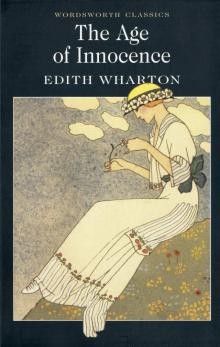 The Age of Innocence
The Age of Innocence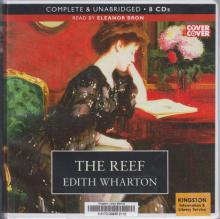 The Reef
The Reef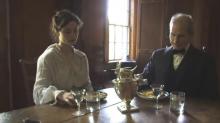 Summer
Summer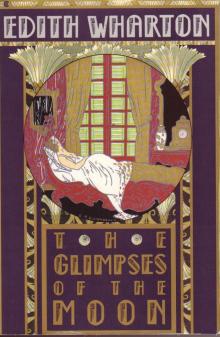 The Glimpses of the Moon
The Glimpses of the Moon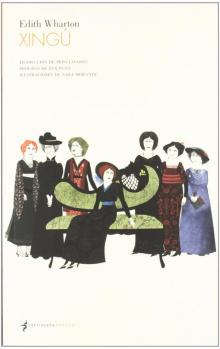 Xingu
Xingu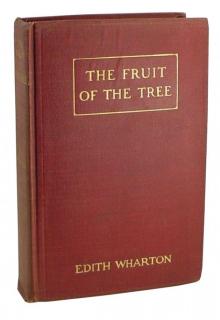 The Fruit of the Tree
The Fruit of the Tree Fast and Loose
Fast and Loose Artemis to Actaeon and Other Verse
Artemis to Actaeon and Other Verse The Line of Least Resistance
The Line of Least Resistance The Lamp of Psyche
The Lamp of Psyche The Reckoning
The Reckoning Afterward
Afterward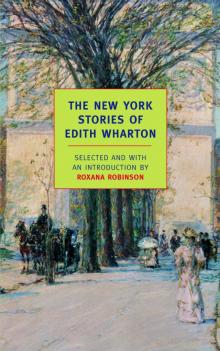 The New York Stories of Edith Wharton
The New York Stories of Edith Wharton The 2014 Halloween Horrors Megapack
The 2014 Halloween Horrors Megapack 'Copy': A Dialogue
'Copy': A Dialogue The Recovery
The Recovery The Fulness of Life
The Fulness of Life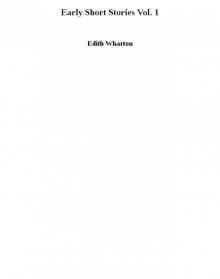 Early Short Stories Vol. 1
Early Short Stories Vol. 1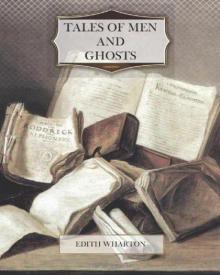 Tales of Men and Ghosts
Tales of Men and Ghosts The House of the Dead Hand
The House of the Dead Hand That Good May Come
That Good May Come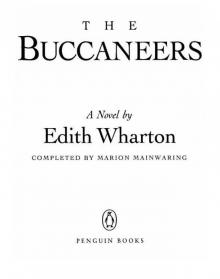 The Buccaneers
The Buccaneers Other Times, Other Manners
Other Times, Other Manners The Hermit and the Wild Woman
The Hermit and the Wild Woman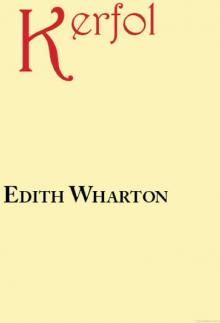 Kerfol
Kerfol The Duchess at Prayer
The Duchess at Prayer Bunner Sisters
Bunner Sisters The Choice
The Choice Madame De Treymes
Madame De Treymes Ethan Frome, Summer, Bunner Sisters
Ethan Frome, Summer, Bunner Sisters In Morocco
In Morocco The Valley of Decision
The Valley of Decision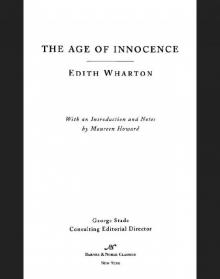 Age of Innocence (Barnes & Noble Classics Series)
Age of Innocence (Barnes & Noble Classics Series) The Angel at the Grave
The Angel at the Grave April Showers
April Showers Sanctuary
Sanctuary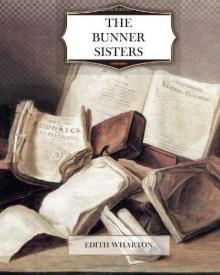 The Bunner Sisters
The Bunner Sisters Mrs. Manstey's View
Mrs. Manstey's View Writing a War Story
Writing a War Story The Custom of the Country
The Custom of the Country In Trust
In Trust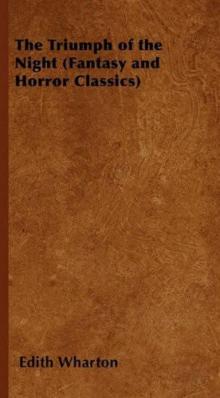 The Triumph of the Night
The Triumph of the Night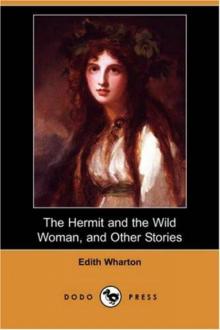 The Hermit and the Wild Woman, and Other Stories
The Hermit and the Wild Woman, and Other Stories Roman Fever and Other Stories
Roman Fever and Other Stories The Mission of Jane
The Mission of Jane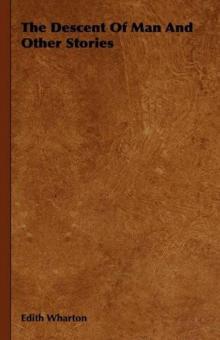 The Descent of Man and Other Stories
The Descent of Man and Other Stories Coming Home
Coming Home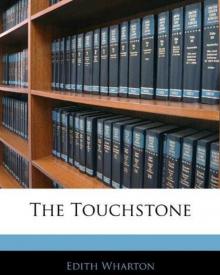 The Touchstone
The Touchstone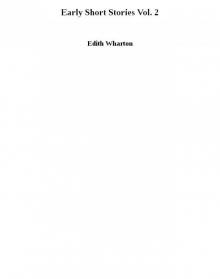 Early Short Stories Vol. 2
Early Short Stories Vol. 2 Edith Wharton's Verse, 1879-1919, from various journals.
Edith Wharton's Verse, 1879-1919, from various journals.